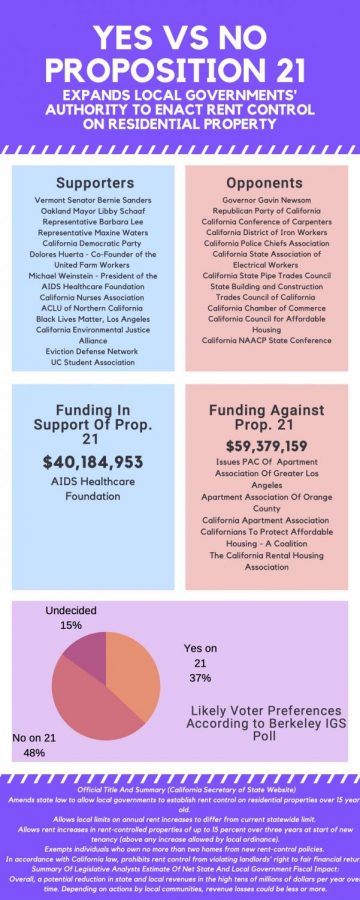Proposition 21 revisits rent control — an issue that can directly impact students’ budgets — on the 2020 ballot.
Passing Proposition 21 would allow cities to stop landlords from raising rents on incoming tenants.
Overall, the goal of Proposition 21 is to keep housing affordable, stop the rapid gentrification going on in neighborhoods and make it possible for long-time residents to stay in their cities.
Under current law, cities are limited in their abilities to enact local rent control ordinances. Local governments can only do so on properties built prior to 1995, 25 years or older, and landlords are able to reset the rental rate, usually to market value, when those rent-controlled properties become vacant or until the last rent-controlled resident leaves.
For students, housing affordability is a topic in mind as they prepare to move out of parents’ homes or juggle rent and bills while focusing on school. Sonoma County is one of many communities struggling to accommodate its residents as rents continue to skyrocket.
“The free market — and by extension every landlord and property owner — is incapable of accommodating the needs of the people,” said Colin Metcalfe, 25, an SRJC aerospace engineering major and Proposition 21 supporter.
“The capitalists ask us to trust them with setting the rent, when they have shown us time and time again they cannot be trusted, when they have driven out family after family, when they have drooled at the acceleration of gentrification in Sonoma County over the years,” Metcalfe said.
Metcalfe thinks Proposition 21 will enable local communities to enact much-needed rent control as they see fit. “While we move towards the abolition of rent and private property, we must take the victories we can along the way, and cut away at the strength of landlords where we can, and passing 21 is a way to do so,” he said.
The Yes on 21 committee reported contributions totaling just over $40 million for this measure, with all the money coming from the AIDS Healthcare Foundation. It was also the biggest group sponsoring Proposition 10 in 2018.
Voters rejected Proposition 10’s rent control measures in 2018 with a 59% majority voting no. Proposition 21 would expand the number of properties that could go under rent control. If it passes, properties that are 15 years or older could be included in local rent control ordinances.
A lot of the arguments against Proposition 21 cite cities losing revenue due to landlords paying lower property tax. The official “No on Prop. 21” website also states homeowners would lose their rights when renting their properties, and the measure could overall devastate rental housing market values. Opponents also say rent control would limit the state’s economic bounce back from the pandemic.
According to the California Secretary of State, Proposition 21 has more committees against it than for the measure with the money coming from five separate committees. The California Rental Housing Association contributed $379,500 against the measure and the California Apartment Association donated more than $49 million dollars against it along with several other apartment associations. Opposition against Proposition 21 totaled over $59 million.
Many of the opposition arguments are profit-based arguments and many misrepresent what this proposition actually is. Proposition 21 includes a fair return rate for homeowners, meaning they can still turn a profit. Proposition 21 actually protects that profit, yet it limits it.
This proposition also states that rent control cannot be enacted on smaller landlords, defined as owning no more than two single-family properties. So the biggest impact would be on larger or corporate landlords, who can better afford to reduce their profits. Proposition 21 would help slim down profit margins.
Another major argument against Proposition 21 cites a potential decrease in housing availability since developers would be discouraged by reduced profits, and landlords would sell their rental properties to owners who would live in them, thus taking those rental properties off the market. Opponents say this would only further aggravate California’s current housing crisis.
“I think that rent control has a place, but I think there are a bunch of other issues that factor in that rent control doesn’t address,” said Rep. Mike Thompson (D-5th District) in a question-and-answer session with The Oak Leaf.
“More specifically the job that the collective we have done in regard to building an adequate amount of housing. We don’t do a good job at that, and local governments are struggling with that now. I don’t think Prop 21 solves the problem. I could probably make the case that it exacerbates the problem,” Thompson said.
Gov. Gavin Newsom is another voice against the proposition. Newsom passed AB 1482 last year in order to address rising rents, but Proposition 21 does more than limit rent increases.
“Proposition 21, like Proposition 10 before it, runs the all-too-real risk of discouraging availability of affordable housing in our state.” Though Newsom and Thompson are against it, supporters include the Democratic Party and U.S. Senator Bernie Sanders.
“This initiative will allow California cities to pass sensible limits on rent increases and protect families, seniors and veterans from skyrocketing rents,” Sanders said. “I was born and raised in a three-and-a-half room, rent-controlled apartment in Brooklyn, New York. That most minimal form of economic security was crucial for our family, but today that type of economic security does not exist for millions of Americans. That has got to change.”





